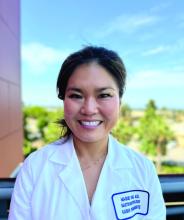Conclusion
While I cannot directly compare my experience to the LKA, the traditional 10-year exam has both strengths and weaknesses. It requires extensive preparation and is high stakes, but it offers a clear endpoint and comprehensive review. The choice between the 10-year exam and the LKA depends on individual preferences, learning styles, and professional circumstances. In an academic environment, the traditional exam can be a good option, but continuous medical education remains essential regardless of the recertification method chosen.
Dr. Protiva is associate chief of gastroenterology at the West Haven (Conn.) VA Medical Center, and associate professor of medicine (digestive diseases) at Yale School of Medicine, New Haven, Conn. He has no disclosures related to this article.
The Longitudinal Knowledge Assessment: Flexible and Convenient
BY MAGGIE HAM, MD, AGAF
I completed my initial certification exam in 2013 when I completed gastroenterology fellowship training at the Beth Israel Deaconess Medical Center in Boston. I am currently in clinical practice at Southern California Permanente Medical Group in Ventura, California, where I see patients and perform endoscopy daily.
I practice general gastroenterology and hepatology with an emphasis on inflammatory bowel disease, colon cancer prevention, and women’s health. I am also the medical director of the gastroenterology lab at Community Memorial Hospital in Ventura, physician in charge of a building at Kaiser, and assistant chief of gastroenterology. My husband and I are both gastroenterologists with a child in elementary school.
Two years ago, I decided to embark upon the Longitudinal Knowledge Assessment (LKA) for gastroenterology. This is offered by the American Board of Internal Medicine (ABIM) in lieu of the 10-year recertification examination. As a full-time working mother, I could not fathom the time it would take to study and sit down for the high-stakes 10-year exam.
The LKA consists of 30 questions per quarter, which equates to 600 questions over 5 years. One hundred questions may be skipped over the 5-year period. The questions can be answered from anywhere with an internet-connected device without any camera monitoring. I would often answer questions from the comfort of my own home using my laptop, but could also do so using my phone while waiting in line at the store or on a long plane ride. The 30 questions do not need to be answered in the same sitting, so within the quarter I can save my progress and answer the remaining questions at my convenience. This has worked well for me alongside my personal and professional obligations.
I can download my progress report which informs me of my score, and what the passing score is. I can see what the average score is, how I am performing relative to that, and how I am faring in each category (ie, esophagus, stomach and duodenum, liver, etc.). I also receive Maintenance of Certification points with each LKA question I answer correctly. With the 10-year ABIM recertification exam, I would still need to complete MOC.
While there is a 4-minute time limit for each question, it really has not been an issue. If needed, I can request to extend the time, to read or to look things up. It is an open book exam, so I have learned and kept abreast of GI knowledge. Any references other than another human may be used. I typically use UpToDate and the GI society guidelines, which have been sufficient. Occasionally there are experimental questions sprinkled throughout the exam, so I may never know the answer. Otherwise, the solution to each question will be presented to me immediately upon answering, with an explanation accompanied by references. I appreciate that this keeps me updated with the latest guidelines and recommendations, which was my primary reason for selecting the LKA.
At the end of the 5 years, you may choose to continue the LKA cycle, or take the 10-year exam. If you do not pass the LKA, they do give you a 1-year grace period to pass the exam if you want to continue to participate in MOC.
The quarter does seem to come around fairly quickly, but they do send frequent reminders by email or text as the deadline approaches. And if you forget to answer all the questions in a quarter, the LKA allows for 100 questions that may be skipped over the 5-year period.
Being able to answer questions from anywhere at any time is incredibly flexible and convenient. The immediate feedback is also great and helps me identify my strengths and weaknesses. While I will not know until the end of the 5-year period whether I have passed or not, I can check my progress report which gives me an idea of where I stand. Overall, I would say I am satisfied with the LKA, as it has been easy to maintain certification while effectively contributing to my continuing medical education.
Dr. Ham is a gastroenterologist at Southern California Permanente Medical Group in Ventura, California. She is also medical director of the gastroenterology lab at Southern Community Memorial Hospital in Ventura. She has no disclosures related to this article.



